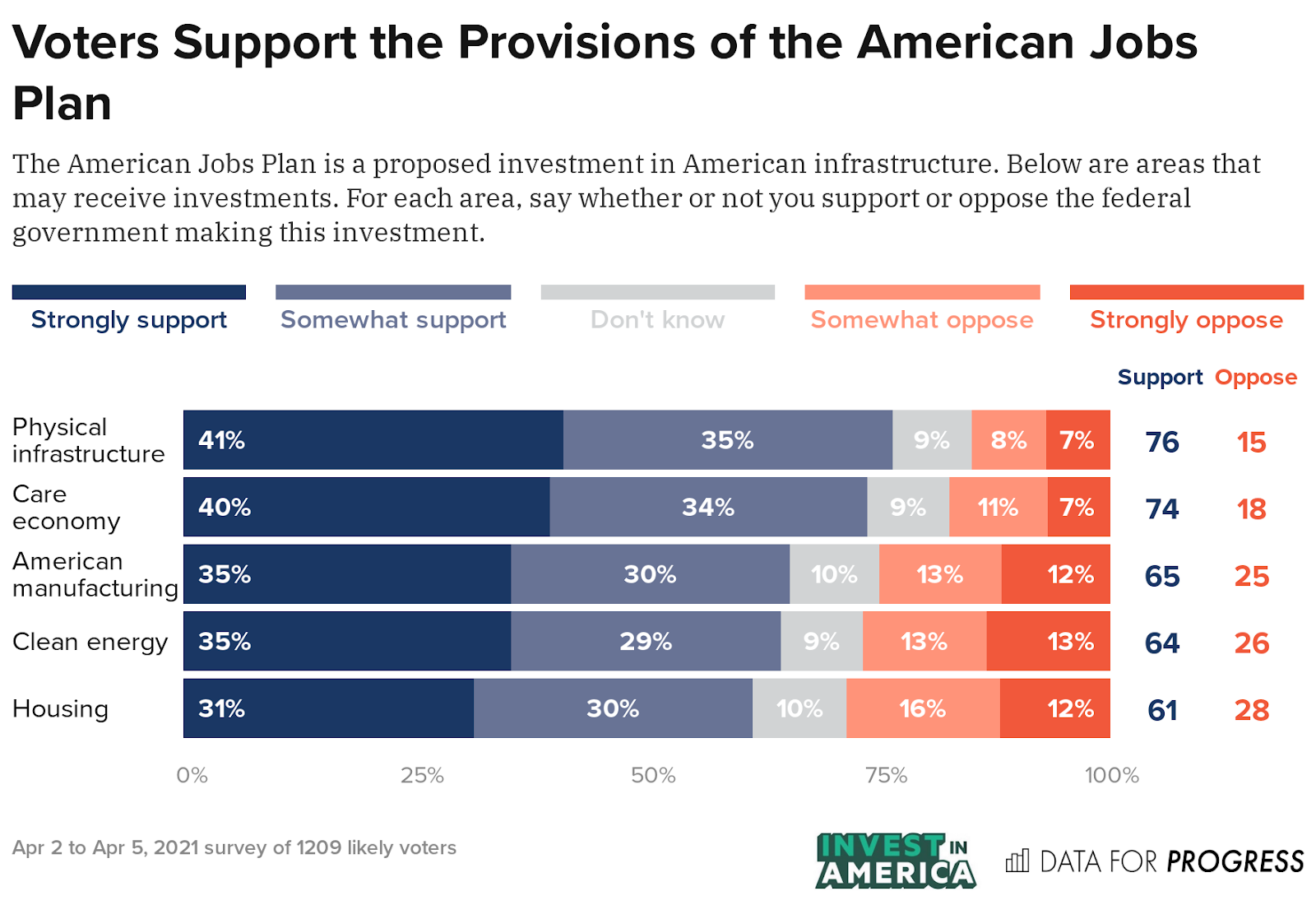Voters Support the American Jobs Plan
By Ethan Winter and Evangel Penumaka
Last week, President Joe Biden released the American Jobs Plan — a proposal to invest $2.25 trillion over the next eight years to rebuild our nation’s infrastructure, promote clean energy, create good-paying jobs, strengthen American manufacturing, and bolster the care economy.
In an April survey of likely voters nationally, Invest in America and Data for Progress tested the attitudes of likely voters towards the American Jobs Plan. We find that the majority of likely voters support the proposed multi-trillion dollar investment. In addition, we find that likely voters also back some of the individual components of the proposal, such as investing in physical infrastructure, American manufacturing, the care economy, and housing. Crucially, this majority includes considerable support from likely voters that self-identify as Republican.
Among all likely voters, we find that the American Jobs Plan is backed by a 52-percentage-point margin (73 percent support, 21 percent oppose). Notably, support for this proposal is bipartisan, garnering an impressive 19-point margin of support from Republicans (57 percent say they support the plan, while 38 percent oppose).
We also tested some of the individual components of the American Jobs Plan, including investments in America’s care economy, housing, American manufacturing, clean energy, and physical infrastructure. We find all of the planks tested enjoy considerable support among likely voters.
For example, investments in physical infrastructure and the care economy — specifically long term care for seniors and people with disabilities — are backed by 61-point and 56-point margins. Meanwhile, investments in American manufacturing, clean energy, and housing are supported by margins of 40 points, 38 points, and 33 points, respectively.
Invest in America and Data for Progress find support for continued investment in the American economy remains high, even after the passage of the American Rescue Plan. A bipartisan majority of likely voters support the American Jobs Plan and are enthusiastic about this legislative priority of the Biden administration.
Toplines to this polling can be found here.
Evangel Penumaka (@evangelpenumaka) is an analyst at Data for Progress
Ethan Winter (@EthanBWinter) is a senior analyst at Data for Progress. You can email him at ethan@dataforprogress.org
From April 2 to April 5, 2021, Invest in America and Data for Progress conducted a survey of 1,209 likely voters nationally using web-panel respondents. The sample was weighted to be representative of likely voters by age, gender, education, race, and voting history. The survey was conducted in English. The margin of error is ±3 percentage points.
Question Wording
The American Jobs Plan is a proposal to spend $2.25 trillion on infrastructure investments over eight years. The plan includes funding for the following:
Repairing roads, bridges, and schools
Repairing drinking water systems
Investing in American manufacturing
Expanding internet service
Modernizing America's electrical grid
Creating millions of good-paying jobs in a modern American energy sector
Funding the cleanup of mines and abandoned gas wells
Do you support or oppose the American Jobs Plan?
Strongly support
Somewhat support
Somewhat oppose
Strongly oppose
Don’t know
The American Jobs Plan is a proposed investment in American infrastructure. Below are areas that may receive investments. For each area, say whether or not you support or oppose the federal government making this investment.
$650 billion for physical infrastructure: repairing roads and bridges, updating drinking water systems, and expanding broadband infrastructure to rural areas
$400 billion for clean energy technologies, such as modernizing our electric grid with efficient, reliable, and clean energy infrastructure
$400 billion for the care economy, such as investing in long term care for seniors and people with disabilities
$300 billion for promoting American manufacturing: creating jobs, building zero-pollution technologies — such as building more electric vehicles — and keeping America competitive globally
$300 billion in housing investments to build enough homes to meet rising demand and bring down housing prices
Strongly support
Somewhat support
Somewhat oppose
Strongly oppose
Don’t know


